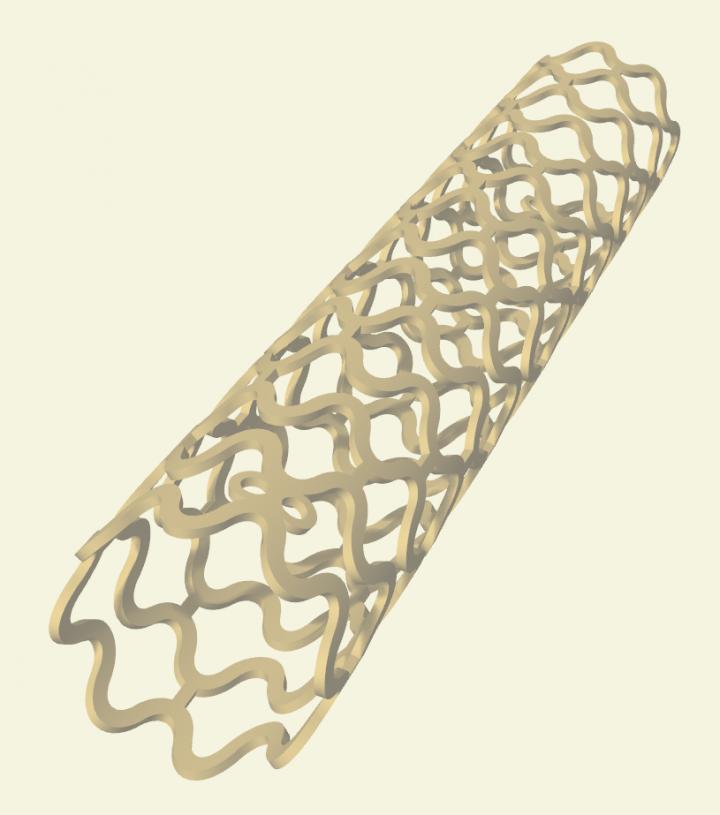Project — funded by Innovate UK and Medical Research Council Biomedical Catalyst 2018, Round 1 Competition — will see bioresorbable stents treating severe vascular disease and dissolving within 2 years after implant

Credit: Arterius Limited
A £1.1 million project to develop biodegradable stents for patients with severe vascular disease, which affects around one million people in the UK, has started thanks to Innovate UK funding. The unique project, a collaboration between the UK-based medical device company Arterius and the Translational Biomedical Research Centre (TBRC) at the University of Bristol, will develop a new type of bioresorbable stent that prevents the complications associated with metal stents.
Severe peripheral vascular disease (PVD) is caused by the formation of blockages in arteries, which reduces blood supply to the brain, heart, kidneys and limbs causing strokes, heart attacks, kidney failure and limb amputations. The disease is a growing international healthcare problem affecting about 20 per cent of the UK population aged 55-80 years and 200 million people worldwide.
Current treatment for the condition relies on permanent metal stents being inserted through a needle over a wire into the blocked artery to open up the blockage. However, these metal stents are associated with early blood clots and long-term chronic inflammation at the stented site. This triggers recurrence of blockages within one to two years (also known as in-stent restenosis) leading to readmissions, repeated revascularisation and huge hospital costs.
The two-year project is the culmination of a research-industry consortium comprising University of Bristol researchers led by Professor Raimondo Ascione at the Bristol Medical School and Dr Kadem Al-Lamee, CEO at Leeds-based medical device company Arterius.
Together, the team will join strengths and expertise to refine existing Arterius’s technology to develop smart peripheral bioresorbable stents with novel mechanical and biocompatible properties able to treat the blockages and then dissolve between 18 to 24 months. The new device aims to prevent the life-long presence in the treated arteries of a metal stent and the associated chronic inflammation/restenosis and complications.
Professor Raimondo Ascione, Chair of Cardiac Surgery and TBRC Director at Bristol, said: “There is a huge need for innovation based on rigorous preclinical development and testing in the area of severe peripheral vascular disease. We are delighted to join forces with Arterius to form a unique UK-based biomedical consortium with potential to be a global player in this field.”
Dr Kadem Al-Lamee, CEO, Arterius Ltd, added: “Development funding supported by the Innovate UK programme will significantly help us to continue our ongoing collaboration with top UK universities, in order to explore this ground-breaking research in the cardiovascular field. Thanks to this project, Innovate UK, our technology, and the partnership with TBRC-Bristol, we could help millions of patients globally.”
They also agreed: “Our primary goal of this consortium is to develop bioresorbable smart stents for pre-clinical assessment in carotid and iliac-femoral arteries as well as a platform technology, which we plan to use to tackle in the future other areas of peripheral vascular disease such as below the knee, given the high level of biomedical innovation.”
The team plan to develop and test the prototype smart stent for safety and efficiacy using state-of-the art clinical and imaging technologies at Bristol’s TBRC preclinical facility. The ultimate goal is to take this new device to the bedside in a first in man trial in three to four years.
Professor Nishan Canagarajah, Pro Vice-Chancellor for Research at the University of Bristol, added: “This innovative project illustrates how universities and industry can work together by applying their expertise to develop safe and effective novel technology for global public health benefit.
“Through this collaboration, the potential gains to the healthcare sector are vast. By improving this procedure hospital readmission rates could be reduced therefore delivering major cost savings to the NHS and beyond.”
The Innovate UK-funded project, entitled ‘Preclinical Development and Testing of Innovative Bioresorbable Stents to Treat Patients with Severe Peripheral Arterial Disease’ started on 1 March 2019.
###
Media Contact
Joanne Fryer
[email protected]




